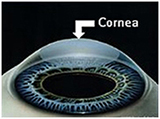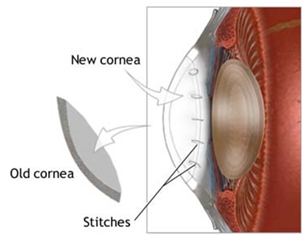CORNEAL TRANSPLANTS
WHAT IS THE CORNEA ?

The cornea is the clear covering of the front of the eye that focuses incoming light. To maintain clear vision the cornea must have the correct shape and clarity. When the cornea becomes cloudy or misshapen, a corneal transplant may be indicated to restore vision, alleviate pain or repair eye integrity.
WHAT IS A CORNEAL TRANSPLANT ?
With corneal transplants, scarred or damaged tissue is replaced with healthy donor tissue. Corneal transplants either replace the whole cornea (standard full thickness known as Penetrating Keratoplasty) or individual layers (partial thickness known as DSAEK, DMEK and DALK). The type of transplant performed depends on the prior condition and extent of the damage.
INDICATIONS FOR FULL THICKNESS CORNEAL TRANSPLANTS
- Advanced keratoconus with severe scarring
- Severe Herpetic scarring
- Full thickness traumatic injury
INDICATIONS FOR DSAEK AND DMEK
- Fuchs’ dystrophy
- Corneal failure after cataract, glaucoma or retinal surgery
- Endothelial failure or rejection of a full thickness transplant
INDICATIONS FOR DALK
- Keratoconus, corneal scarring & pellucid marginal degeneration
- Stromal Corneal Dystrophies
- A healthy endothelium (the innermost layer of the cornea)
HOW DO I KNOW IF I WOULD BENEFIT FROM A CORNEAL TRANSPLANT ?
A corneal transplant is normally indicated once your damaged cornea interferes with your ability to do activities important to you or is causing significant constant pain not treatable by other means.
THE ROLE OF THE EYE BANK OF B.C.
Every year in B.C. over 500 people require a corneal transplant which uses tissue generously gifted by registered organ donors who have passed away. All donated corneas are verified to be healthy, clear and appropriate for you.
HOW IS THE SURGERY PERFORMED ?
Corneal transplants are generally done under local anaesthetic. With full thickness transplants, the damaged cornea is removed through a process called trephination and replaced with a donor cornea. The transplant is then secured using tiny stitches about 1/3 the thickness of a human hair. Partial thickness transplants replace only certain layers, leave the rest intact and use fewer stitches. On treatment day, you will be instructed to arrive at the hospital about 1.5 hours in advance and the surgery will take approximately 30 minutes. No overnight hospital stay is required.
WHAT ARE THE POSSIBLE COMPLICATIONS ?

The success rate of corneal transplants has drastically improved in the last 30 years. Today, the overall success rate is above 85%. However, it can vary from 50% to 95% depending on the condition being treated. Dr. McCarthy will go over your individual case with you.
Corneal transplants remain a serious surgery with certain risks that you should be aware of. The primary risks are rejection and infection which are minimized with the use of antibiotic and steroid drops. Other less common complications include bleeding, swelling, glaucoma and retinal detachment. Fortunately, the majority of complications are treatable and have good outcomes.
HOW LONG IS HEALING TIME ?
Healing time is different for everyone. You can expect to have moderate discomfort, irritation and redness for up to 3 weeks. Best possible vision is achieved once wounds have fully healed and stitches removed. Healing of a full thickness transplant can take up to 1 year. Visual improvement with DMEK and DSAEK usually occurs in a few weeks.
WHAT DO I NEED TO DO BEFORE AND AFTER SURGERY ?
You should ensure that you understand all instructions provided. You will start taking antibiotic drops 3 days prior to surgery and continue until the bottle is empty. You will also take steroid drops that will be gradually reduced over time to 1 drop per day, but you will likely continue permanently. It is essential to take your drops as prescribed to maintain function of the transplant. After surgery you should avoid any heavy lifting and strenuous activity for 1 month.